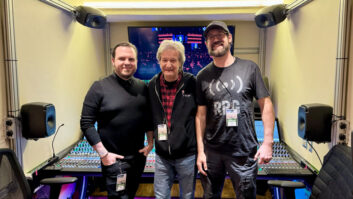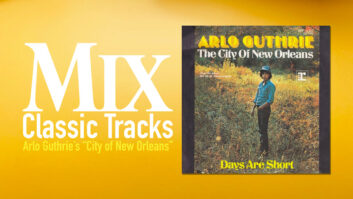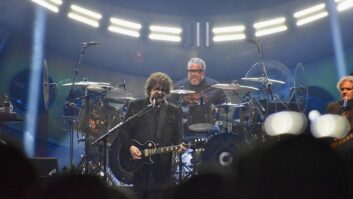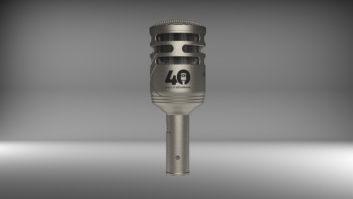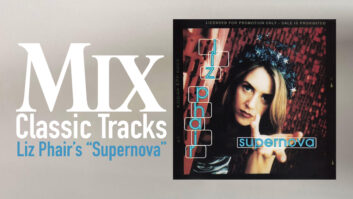The world is a better place for having Little Feat in it. Had they never played another note together after they disbanded in the late ’70s following the death of their ostensible leader and frontman, Lowell George, their place in rock history would be secure. Albums such as Sailin’ Shoes, Dixie Chicken, Time Loves a Hero and the live Waiting for Columbus document a superb, tight, eclectic band that moved easily from New Orleans-inspired funk to rock ‘n’ roll to jazz-influenced instrumentals, while always retaining a distinctive group sound. In slide guitarist George, lead guitarist Paul Barrere and keyboard wizard Bill Payne, the band had a powerhouse front line of players and singers. And the Little Feat rhythm section—bassist Kenny Gradney, drummer Ritchie Hayward and percussionist Sam Clayton—was second to none when they were really “on.”
After Lowell George’s death, it was nearly 10 years before the group reconvened for the critically acclaimed album Let It Roll in 1988. The band has been touring and making new records ever since, and if anything, they are even better musicians now than they were at the band’s commercial peak. They’re still a dynamite live attraction that never fails to get an audience up and dancing, and post-Lowell albums such as Ain’t Had Enough Fun and their most recent studio affair, Chinese Work Songs, show that there is still lots of spirit in the band and great songs to be shared.
Besides Chinese Work Songs (which includes great covers of The Band’s “Rag Mama Rag” and Phish’s “Sample In a Jar,” among other delights), the group’s illustrious career was recently celebrated in the superb Rhino Archives box set, Hotcakes & Outtakes. The four-CD set beautifully chronicles the entire history of the group and includes a full CD of demos, alternate versions and rarities. The accompanying booklet contains a fine historical essay, session annotation and many photos.
Not long ago, I spoke with Paul Barrere and Bill Payne about the box, Chinese Work Songs and recording with Little Feat. They had just returned from a European tour that included a gig in Kosovo, where they played for U.S. troops while wearing flak jackets!
I gather that Chinese Work Songs was cut mostly live, with the entire band playing at once.
Bill Payne: Right. We wanted to do it with everyone in the room, with the exception of Sam, who lives a little further away from everyone else. It sounds like a no-brainer to work that way, but a lot of times we’ll go in and record with just two or three people at a time. But this was sitting in one room together.
Paul Barrere: This was at my house, in a converted garage that’s almost like a studio, but not really. [Laughs.] We brought in an 02R and a Pro Tools system that [engineer] Nathaniel Kunkel had. Before we started the project, we were discussing what format to use, because Billy and I both own DA-38s and that’s what we did Under the Radar on, but Nathaniel had this Pro Tools system that he swore he could make it work like a 24-track machine and it would be quick, it would be simple. And he was right. He knows his way around those things. I was amazed at how good he got it sounding so quickly.
Payne: There were a few fixes and we overdubbed percussion, both Sam and Lenny Castro, and we overdubbed the horns, too.
Barrere: We had to clear some space in the room to get those guys in. It would’ve been a problem to have so many open mics in the room if we’d had horns and percussion in at the same time as the band. Fred [Tackett, second guitarist] uses an old Deluxe amp and I use an old Vibrolux, and all we had to do was put some stuff up between them and throw furniture pads over them and those two mics, and then all the drum mics were the only real live mics in the room. Kenny [Gradney] was going direct, and Billy was mostly going direct.
Did it change the dynamic of the group not having Sam Clayton’s percussion in there? It’s so much a part of the Little Feat sound…
Payne: It is. We had to sort of imagine it being there. There was a leap of faith on “Just Another Sunday” when we hit the instrumental portion where the beat breaks down right before we take off to Fred’s guitar solo. I asked Ritchie [Hayward] to play a quasi half-time feel and leave it as open as he could, because there would be percussion and other things going in there, and it took him a second or two to adjust to that.
You guys tend to record songs and then take them out and play them live, rather than vice versa, right?
Barrere: Actually, it works both ways. “Eula” [on Chinese Work Songs] is a song that goes back to the Ain’t Had Enough Fun days that, for whatever reasons, never captured our fancy back then. The basic track was recorded as a demo on my old Fostex 8-track, so what we did was take that basic track—the guitar and vocals—and passed it over to the Pro Tools system, and then we put in Billy playing this old acoustic piano I have in my living room…
Payne: That was almost by accident. I was walking to the kitchen and I said, “Hey, does this piano work?”
Barrere: It was just out of tune enough…[Laughs.] Then we put Ritchie and Kenny and Sam on and some vocal overdubs.
I really like the version of The Band’s “Rag Mama Rag.” It totally sounds like a Little Feat song…
Payne: Yeah, we sussed that tune out. A lot of what this record was about, maybe not consciously, was influences. There’s Dylan on there, some blues. And the influences go back and forth. We’ve certainly influenced Phish, or they said that we have, and they’ve influenced us. I’m not sure we influenced The Band in any way, but Levon Helm had a huge smile on his face when he heard we’d cut the track and when he actually heard the song.
Let’s talk about the box. One of the things that always struck me about Little Feat is that you always made good records—you were able to translate the band’s energy pretty well in the studio. You were able to be loose enough to be the way you were live but tight enough to make solid records. Why is that?
Payne: That’s a good question. Certainly we’ve been accused of not being as good in the studio as we were live, but I think we made some good records; they stand up well.
My background, other than playing classical music, is that I’ve done an extraordinary amount of session work. I’ve often told people that whether you’re writing music or recording music, it’s a lot like sneaking up on a glass of water to get a drink. You have to assume a role; that’s how I tricked myself into it. A lot of people are camera-shy, for example, and a lot of people get weird when the red light is on in the studio or they have to perform and there isn’t the ambience of a crowd or crowd noise. And the mix you’re listening to usually is a little strange. So I learned in the early days, if you don’t like what you hear in the phones, go in the control room and fix it until you do. But, also, recording is a process, and every time you go into the studio, you both learn and forget bits and pieces of information about it. Every song, every record, whatever growth period you’re at, takes its toll and adds to your glory when you go into the studio.
Every song, every record, whatever growth period you’re at, takes its toll and adds to your glory when you go into the studio.
—Bill Payne
Beyond that, Lowell was a guy who liked the studio and who knew a lot about making records and cared about it, usually.
The rise of Little Feat coincides with the rise, for better or for worse, of bands recording in multiple studios. Here’s Sailin’ Shoes being done at Amigo and Sunset Sound and Sun West…
Payne: Well, a moving target is hard to hit… [Laughs.]
How much of that was the influence of people like [Warner Bros. producers] Russ Titelman and Ted Templeman wanting to work in different places, and how much of it was the peripatetic world you lived in or not being able to get people together?
Payne: It might have had something to do with those guys, but I’d lay it more on Lowell. He was a very bright guy who loved to experiment, and that included experimenting with recording in different rooms with different sounds. He was very aware of room sounds and what they might do to the drums or to a guitar or anything. That was one of the strengths of Lowell—he wasn’t afraid to use that mystery part of an artist and say, “Let’s make it even more mysterious and more eclectic and take some shots at doing things differently.”
I gather he was somewhat autocratic in the studio.
Barrere: He was and he wasn’t. Lowell was very strange. He would dangle the carrot out in front of you and get you to go for stuff and let you feel like you were actually going to have a say in some things, and then, lo and behold, things would change. He also did a lot of work on his own late at night in studios, so things were rarely the way you left them the night before when you’d been there. [Laughs.]
You guys were lucky in that you came along at a time when radio was pretty open, so there weren’t these insane expectations about what was a “radio-friendly” song. It was a more experimental era in all ways.
Payne: That’s a very interesting point to bring up. Pop music’s undercurrents have always been there. It was indeed a more experimental time. What was going on at Warner Bros. is that we were, along with Van Dyke Parks and Ry Cooder and Randy Newman, Dr. John and, later, Bonnie Raitt, allowed a freedom to do what we did without having to worry about how many records we were going to sell. So that existed, but it existed within the realm of artists and acts that were bringing in money for the company. That is not a situation that exists today. Artist development? What the hell is that? There is no artist development anymore, so how do these labels expect to be afloat 10 or 15 years from now? And now you’ve got all the Internet stuff happening with Napster and all that, and the labels really don’t know what hit ’em.
They’re freakin’ out!
Payne: They should be, because they haven’t been paying attention to much of anything for years other than the bottom line and trying to make giant hit albums. It’s biting them in the ass, and there isn’t anything they can do about it at this point.
In an odd way, we may be looking at a lot more freedom than we had back then, forgetting radio, because that has become so restrictive. There’s so much stuff out there now, and new ways of doing things and promoting things and getting the music out, but you have to look a lot harder for it. The good part of that is that people are looking for it and bypassing conventional things.
Barrere: We’re all learning how to do it. Young people are probably ahead of the curve, technologically, and people my age are a little slower to get on it.
Payne: I think we have a better chance than we did 10 years ago, but it’s such a free-for-all out there I wouldn’t dare predict what’s going to happen. But the Pandora’s Box is open.
Tell me a little about working with Ted Templeman. He made lots of great records in the ’70s. What was it about his personality that allowed him to work with a headstrong guy like Lowell and so many other gifted artists?
Barrere: The thing I liked about Ted is that when Billy and I went to his office before we started Time Loves a Hero, and he was the producer of the record and he had Don Landee, who was a wonderful engineer, Ted gave us a lot of freedom. He was great at rhythm sections and talking to drummers and percussionists and getting them on the same page and finding the groove fairly fast. And Don was always right there getting the great sounds on ’em. He was also full of good ideas—like I remember he suggested that on “Keeping Up With the Joneses” that we go for that Ray Charles string sound, and then Billy thought of the idea of, since we’ve got the string section there, why not put that crazy Marx Brothers ending on “Old Folks Boogie”? Ted’s a very musical cat, and he had a nice, easygoing nature. He managed to keep things going.
Payne: I would just add that Don Landee was always there to help you out and work with you. A lot of times, engineers would stake out their turf and say, “This is how it’s done.” But what was great about Don, and people like Nathaniel [Kunkel] and George Massenburg, too, is they’re willing to meet you halfway or ask you what it is you’re after and then help you get it. It doesn’t mean that what I’m looking for is necessarily the best idea, but they don’t prejudge it.
I remember one time, during a period when everybody was using the Rhodes, I really loved these certain sounds I got out of a Wurlitzer—it had an explosive quality in rehearsal that we couldn’t seem to get in the studio. But Don really listened to what I was saying, and he figured out how to add the compression I needed to get that strong, huge sound I was looking for. A lot of engineers wouldn’t take the time to do that.
You guys were working with George Massenburg before he was GEORGE MASSENBURG, revered audio guru!
Payne: [Laughs.] Well, he was already doing great stuff, though he wasn’t well known. He’d designed the parametric equalizer. I had no idea how brilliant he was, quite honestly; that came later. Paul, wouldn’t you say he’s a really easygoing guy?
Barrere: Extremely easygoing, but also kind of a prankster. He fit in really well with Little Feat, especially with some of the antics of Lowell and myself. It’s interesting—on this box set there’s the original “All That You Dream.” That was something that when we were back in Maryland [at Blue Seas Studio, where Massenburg was an engineer] doing Feats Don’t Fail Me Now, I kept trying to get Lowell to listen to the song, and he just said, “Ehhh, go away kid, you bother me!” shit, which I got a lot of from him, ’cause he was sort of like an older brother to me, since he knew me since I was a 12-year-old punk. But George [Massenburg] liked the song, and he said, “Come on in tonight and we’ll record it.” So I got Ritchie and we made a demo of the song. And then for about a year George would be in the studio whistling the hook, and finally Lowell said, “What is that?” So George played him the demo, and Lowell says, “Oh, that is a good song!” That son-of-a-bitch! [Laughs.] We ended up cutting the song eventually, and then Lowell thought he could make it into a single, and about $80,000 later, it was just about the same as the way we did it originally for the record. [Laughs.]
What was Blue Seas like? It must have been odd to go from recording in L.A. to Maryland?
Payne: Well…it was a chance to…heal. [Laughs.]
Barrere: [Laughs.] He’s right.
Payne: We had all sorts of horseshit going on around the time of that record. We were kind of burned out and had various problems. We were kind of scattered. Lowell and I were supposed to be in a band with John Sebastian and Don Everly, some kind of super band that thankfully fizzled out before it had a chance to go anywhere. I was with the Doobie Brothers on a tour called “What Once Were Vices Now Are Habits” and about two weeks into that I respectfully bailed out and started touring with Bonnie Raitt. Lowell was in New Orleans working with The Meters and Allen Toussaint on a Robert Palmer record called Sneakin’ Sally Through the Alley—a wonderful record—and Bob Cavallo, who was our manager at the time, spoke to Steve Boone, who had also been with the Lovin’ Spoonful, and Steve had a studio back in Maryland, Blue Seas. It was Cavallo’s idea to re-center the band back in Baltimore; give us complete freedom to record and do what we wanted, put us in an atmosphere away from Los Angeles, and by God, it worked. That’s a good record.
Do you think Lowell picked up much from Templeman in terms of being a producer?
Barrere: I think he definitely got some smarts from his dealings with Ted and with Russ [Titelman] and the engineers, especially Don. He also picked up a lot from Van Dyke Parks, including getting that sound on the slide, which was a Russ Titelman-Van Dyke idea, using dual compressors and all that.
Payne: And that came through Ry Cooder.
Barrere: But Lowell was a very smart cat and he picked up a lot. I’m sure he picked up some miking techniques from George Massenburg. The very first session I ever did with Lowell, I was 18 and it was with myself and Lowell and Dr. John and my brother Michael playing drums and some others, and he would put a speaker in a bathroom and mike it. He had mics all over the place. He was always experimenting.
Were you surprised when Waiting for Columbus, your live album, actually became a hit?
Payne: Yeah, definitely. That album is certainly an icon of live recording, but it’s also a live recording that had a lot of overdubs on it. We never hid that.
Barrere: There were a lot of guitar fixes and there were quite a few vocal fixes.
Payne: And that was largely Lowell’s idea. He said, “Here’s the energy we’ve got; let’s work with it.” I think the drums and keyboards didn’t change much. We edited the keyboard solo in “Dixie Chicken.” One track, “Mercenary Territory,” came from a soundcheck, rather than a show.
Barrere: It wasn’t as blatantly worked on as [The Who’s] Live At Leeds, where you can hear the old tracks in the background. [Laughs.] Warren Dewey, who recorded Waiting for Columbus [along with Massenburg and Andy Bloch] did a great job of getting separation.
I know you guys used to have a big following in Europe and that you recently returned from there. How is it for you now?
Payne: It was great. For some reason, we sort of lost touch with our audience there for a while. I don’t know if we’d fallen out of favor or what. You know, we live with this duality—the band with Lowell and the band without Lowell. There are different camps, and in Europe for a while there was a feeling that without Lowell, it’s not Little Feat. And, of course, there are people here who think that, too, and there always will be some of those. But when we went over there recently, we did very well.
Well, it’s still a kick-ass band. And disc three, with the post-Lowell stuff on it, is really strong.
Payne: I agree. I think it still works. We’re still having fun, and when I look out at the audience, it looks like they’re having fun, too.
Massenburg is a thread that goes through a lot of the story. When you made the decision to come back in the late ’80s and work with George again, that must have added to the stability of the situation. And Bill, you co-produced several Feat albums with George.
Payne: George is great, and he’s definitely a major reason why those albums when we came back sounded so good. It was nice to have that familiarity, to not have to come in cold with someone new at that point.
The way we approached that first album when we re-formed [Let It Roll] is that we got together and worked on some songs, keeping in mind that we were only going to commit to recording them if we thought they were good enough to stand with our earlier work and not hurt our legacy. I knew we had the confidence to make a great record, and I think we did make a great record in Let It Roll. Does it compare to Sailin’ Shoes, which is another one of those iconic records? Or Dixie Chicken? I don’t know. Each of those is its own little thing, but so is each of the later records. I just want people to walk away from a Little Feat record feeling like they’ve been taken some place. And I think more often than not we succeed on that level. The thing with a band like Little Feat is that because we’ve been so eclectic, everyone has different things they like more than others that we do.
That’s the fun part—that you’re “Dixie Chicken” and “Borderline Blues” and “Easy to Slip” and “Day at the Dog Races,” which I was shocked to read in the liner notes that Lowell did not like.
Payne: I guess he didn’t like fusion music, or whatever you want to call it. But also, quite frankly, I think he felt a little left out because he wasn’t that involved with it. He had actually gone to Paul before that and said, “I’d like you to get more involved with the material.” But then when Paul went and did get more involved…[Laughs.]
I don’t want it to seem like I’m denigrating Lowell at all. His genius is way intact. I mean, what a great songwriter, and his guitar playing, his vocals, his lyrics…He was undeniably a genius. But Paul and I have sort of been characterized as stunting his growth around the time we, quote unquote “took over the ship,” around the time of Time Loves a Hero. We spent an inordinate amount of time explaining that that’s not exactly what happened. And if you look at Lowell’s own album from that time, Thanks I’ll Eat It Here, explain to me why there are so few Lowell George songs on there. And the reason is he stopped writing; he didn’t have the focus and energy to do it. And Paul and I thought we had a great thing in Little Feat, and we worked hard in that period to keep it together and keep it strong.
And now here you are all these years later and you guys are managing the band, too, and if anything, Lowell’s legacy has only grown, not diminished.
Barrere: Right. And it should. But Paul and I also have to worry about what’s happening now with Little Feat, and what’s happening next. We’re always looking forward.
